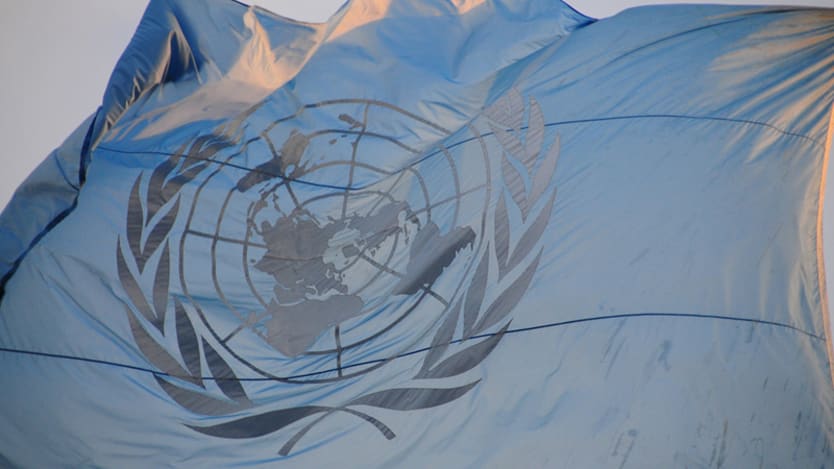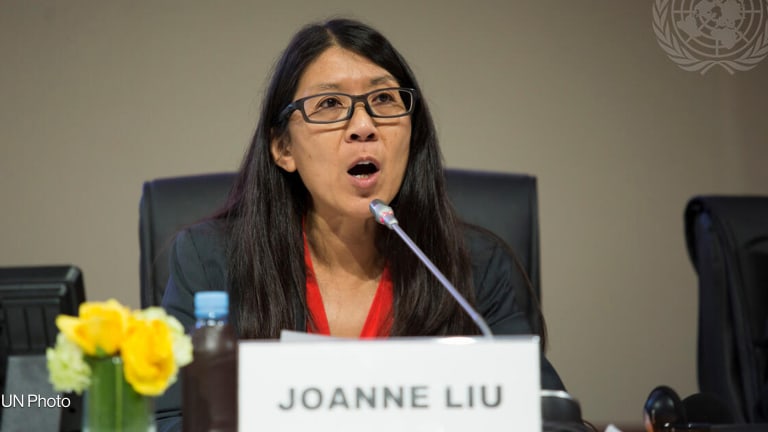For UN whistleblowers and survivors, reporting can have costly, emotional toll

UNITED NATIONS — This spring, the United Nations High Commissioner for Refugees and a former senior investigator, Caroline Hunt-Matthes, reached a private settlement in her case. She argued that she lost her job following an obstructed investigation of a rape in Sri Lanka.
UNHCR issued a rare joint statement with Hunt-Matthes in June, acknowledging there were “matters which in hindsight could have been better managed in relation to the separation.” It had been 15 years since Hunt-Matthes first challenged UNHCR about the decision to not renew her contract and 11 since an appeals process began, making it the longest running whistleblower case in U.N. history, according to a U.N. spokesperson.
Cases of harassment within the U.N. may sometimes take longer than people would like to be resolved, but they are typically conducted with competence, Megan Norbert, an advocate for harassment and abuse survivors in international aid and development, has explained.
But it is also not uncommon that cases regarding harassment and abuse result in a complicated process that passes through multiple U.N. bodies and drags out for years, as multiple interviews with present and former U.N. staffers and whistleblowing experts show. Many of these cases have certain commonalities in procedure that speak to a pattern of how the U.N. handles harassment and whistleblowing cases, experts said. The impacts of passing through the channels also tend to be similar, extending to career upheavals and emotional distress for claimants, as happened to Hunt-Matthes.
“I was having an ‘Alice in Wonderland’ experience,” said Hunt-Matthes, who worked at multiple U.N. agencies and offices, including the World Food Programme, from 1994-2006 and is now a part-time professor in Geneva, Switzerland, specializing in labor law, human resources, and whistleblowing.
More on whistleblowing at the UN:
► The murky process of reporting sexual harassment at the UN
► The high price of being a UN whistleblower
► UN launches staff helpline to address sexual misconduct information gaps
“The reason I stuck it out for 15 years was to show that the system does not work. My motivation was, if we do not sort out whistleblower protection in the United Nations, all we are doing is suppressing corruption, because people will not report anything. And they are not reporting,” she said.
In August, the independent Joint Inspection Unit found that existing protection policies for harassment and abuse survivors, as well as whistleblowers, are marked by “inconsistencies” across different U.N. agencies and need to be strengthened. The report was published as the U.N. continues to address harassment allegations against several high-level officials, and as some agencies work to strengthen internal reporting policies.
Fewer than half of U.N. staffers surveyed in a 2018 staff engagement survey, conducted by a private contractor, have said they believe they would receive protection if they report harassment or abuse. U.N. chief António Guterres has also acknowledged that the number of reported harassment and abuse cases is likely an underestimate.

The emotional toll
Pursuing a case at a U.N. agency or tribunal will take time, but it can also weigh heavily on someone’s future career prospects and their emotional well-being, some experts said.
“People suffer terribly, I think, psychologically and emotionally. It is understandable. If you have ever moved to a new school as a kid and the other kids don't talk to you — it is that kind of treatment. It is ostracism. Everyone is afraid to talk to you, or be seen with you because you are radioactive,” said Beatrice Edwards, a senior international policy analyst at the Government Accountability Project, which both advises whistleblowers and works to validate their claims.
Hunt-Matthes was hospitalized following a car crash during a mission when she learned her contract with UNHCR’s Inspector General Office would not be renewed in 2004. She had complained the year before that her investigation into an alleged rape of a U.N. staff member by another was obstructed — she was blocked from gathering DNA evidence and a supervisor had asked for daily reports of her movements, among other measures.
The U.N. Dispute Tribunal ordered UNHCR to pay Hunt-Matthes more than $50,000 for retaliatory action, but UNHCR then appealed the decision, resulting in the case being dragged out for five more years.
“I have worked on setting up harassment policies and I have worked on whistleblower protection policies. The driving force for me was to see that [even though] all of these policies … are set up in this organization, there was no political will to implement them,” Hunt-Matthes said.
Hunt-Matthes says she is not sure of the exact costs she paid throughout the litigation process, but that the consequences were “predictable.” She struggled to land full-time employment and picked up temporary assignments from colleagues.
A UNHCR spokesperson reiterated language from their joint statement that there were “matters which in hindsight could have been better managed in relation to the separation” and also said that “there has been no legal finding that the nonrenewal of Ms. Hunt-Matthes’ contract was retaliatory.”
“Who is going to guard the guards?”
Different systemic pressures — such as a 60-day time limit to file a complaint — can stack the odds against whistleblowers and people who have experienced harassment or abuse, said Ed Flaherty, a Geneva-based international lawyer.
“In the 21st century there is no justification for [immunity]. You cannot be your own judge. Who is going to guard the guards?”
— Ed Flaherty, international lawyerFlaherty typically represents about six U.N. whistleblowers a year. It’s not uncommon for these cases to last for several years and pass through a number of U.N. bodies, as has happened with one client, Sima Newell.
“You cannot go to local courts because of U.N. immunity. And you have no recourse, which happens because you are not subject to any external, independent, neutral oversight,” Flaherty said. “Whether it is a court or an arbitration board — there is a world of law unto themselves. In the 21st century there is no justification for it. You cannot be your own judge. Who is going to guard the guards?”
For Newell, former director of technology and innovation at UNAIDS, her nearly three-year pursuit of a bullying allegation against her former boss, Jan Beagle, resulted in ongoing emotional distress, she told Devex. Newell said that Beagle tried to intimidate her into working during her maternity and then sick leave, and also gave her excessive workloads. While on medical leave, Newell was demoted to a lower position. That position was abolished 10 months after she filed her claim.
“I was suffering from nightmares and insomnia and your classic symptoms that would follow from that kind of behavior. I raised the issues [of bullying and harassment] with everybody and no one seemed willing to do anything so I filed a formal complaint,” Newell explained. “It is a game [to them]. It is devastating and you relive this every single time [you tell the story and go through the legal processes].”
Beagle, now the under-secretary-general of management and the head of a task force on sexual harassment, has denied the allegations, and in 2017, UNAIDS Executive Director Michel Sidibé rejected Newell’s request for protection from retaliation, following an internal investigation.
Newell, who now works in the private sector, is appealing the decision. UNAIDS said it could not comment on Newell’s case because her legal proceedings are still ongoing before the Administrative Tribunal of the International Labour Organization.
“I had been responsible for all of IT globally, had a team of 30 people, a multimillion dollar budget for over a decade. Then, all of a sudden, nothing. That looks terrible on your CV. I had to change directions because I could not get a reference from Jan or Michel or Luiz [Loures, the former UNAIDS deputy executive director]. What do you do?” Newell said.
Kirsty Griffiths was also removed from her post as distributions coordinator at a joint UNAIDS-World Health Organization initiative in 2006 while she was on sick leave, one year after she filed a harassment complaint against her boss. He would routinely talk about his sex life and the sex lives of colleagues, she said, noting that complaints to their supervisor were not taken seriously.
“It was absolutely awful and for me, it led to health problems, because no one will help you and [you] have colleagues who are so scared for their own jobs they don't want anything to do with you,” Griffiths said. “You end up dreading going to work and have so much anxiety. For at least a year and a half I had to see a psychotherapist and be on antidepressants.”
The ILO Administrative Tribunal found in 2011 that WHO should award her approximately $30,000, due to the delay in Griffiths’ case and the incomplete investigation into her boss, who went on sick leave and did not return to the post.
“The safe way to go is not to complain. It is really not transparent and no one really cares what happens to you if you are insulted or being hurt.”
— Anonymous former U.N. employeeThe loss of income was considerable for Griffiths, who says a few international organizations extended, and then rescinded, job opportunities. She wound up working as an opera singer for several years before finding another job as an investigator at ILO.
“All they needed to do was conduct a proper investigation, conclude that sexual and psychological harassment was undeniably present and fire the perpetrator. Instead, they let this linger for seven years. The perpetrator was never punished. The people who protected him — for their own gains — were never punished,” she told Devex.
“I am from a U.N. family, I wanted to be in the U.N. and to contribute. All of that was pulled out from under my feet because I made a complaint against this incompetent man,” Griffiths added.
Another female former U.N. employee, who asked not to be named because of the sensitive nature of her case, says her mental health also deteriorated after she filed multiple complaints regarding her boss’ regular verbal harassment, which included comments about her nationality. Her boss wound up being transferred to another country.
“This is why the safe way to go is not to complain. It is really not transparent and no one really cares what happens to you if you are insulted or being hurt,” the employee said.
Strengthening U.N. policies will ultimately not address what the Government Accountability Project’s Edwards calls the “tone at the top” of the organization, she says. External, independent arbitration is also key for avoiding conflict of interest.
“In the end it comes down to how all these disputes are decided — there is a conflict of interest in the way they are decided. It is easily addressable with access to external arbitration, but the political will to do that is not there,” she said.
Search for articles
Most Read
- 1
- 2
- 3
- 4
- 5


